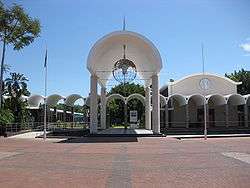Parliament of Botswana
The Parliament of Botswana consists of the President and the National Assembly.[1] In contrast to other Parliamentary systems, the Parliament elects the President directly (instead of having both a ceremonial President and a Prime Minister who has real authority as head of government) for a set five-year term of office. A president can only serve 2 full terms. The President is both head of State and of Government in Botswana's parliamentary republican system. The former President of Botswana is Ian Khama, who assumed the Presidency on 1 April 2008 and won a full five-year term in the postceding Botswana General elections, which were held on 16 October 2009 and returned his Botswana Democratic Party with a majority of 35 (total of 45) seats in the 61 seat Parliament.
National Assembly | |
|---|---|
 | |
| Type | |
| Type | |
| Seats | 61 members |
| Meeting place | |
 | |
| Parliament Building, Gaborone | |
| Website | |
| www | |
 |
|---|
| This article is part of a series on the politics and government of Botswana |
| Constitution |
|
Government |
|
|
Administrative divisions |
|
|
|
There also exists a body known as Ntlo ya Dikgosi, (The House of Chiefs), which is an advisory body that does not form part of the Parliament.[2]
Botswana is one of the two only nations on the African continent since the end of colonial rule to have achieved a clean record of free and fair elections since independence, having held 10 elections since 1966 without any serious incidents of corruption. The other is Mauritius[3]
References
- Constitution of the Democratic Republic of Botswana, 1966
- Proctor, J. H. (1968). "The House of Chiefs and the Political Development of Botswana". The Journal of Modern African Studies. 6 (1): 59–79. doi:10.1017/S0022278X00016670. ISSN 0022-278X. JSTOR 158677.
- US State Department